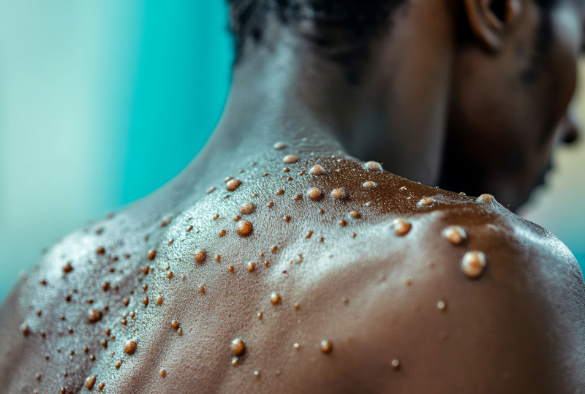Fear Grips Malaba After New MPox Case Emerges at Border Crossing
3 min read

Residents of Malaba are experiencing heightened anxiety following the detection of a second MPox case at the Malaba border crossing. The patient, a 40-year-old truck driver traveling from Mombasa to the Democratic Republic of Congo (DRC), has tested positive for the disease. He is now in isolation at Alupe Sub-county Referral Hospital, where he is receiving specialized treatment.
Busia County has become the second region in Kenya to report an MPox case amid a broader global outbreak. This disease, which has gained prominence following COVID-19, is now a significant health concern. The first MPox case in Kenya was detected at the Kenya-Tanzania border, with successful management of the situation reported as the victim recovered.
Dr. Evans Sumbeiyo, the Medical Officer in Charge at Kocholia Sub-County Hospital, confirmed the recent case. Health Principal Secretary Mary Muthoni also validated the rare MPox diagnosis, indicating potential shifts in the country’s approach to controlling the disease.
The driver arrived in Bunya District, DRC, on August 1, 2024. After a brief stay, he traveled to Uganda on August 3, 2024, and spent three days loading cargo before returning to Kenya through Malaba on August 6, 2024. Notably, he did not pass through the Port Health screening desk or Immigration Department at Malaba OSBP.
The truck driver subsequently traveled to Mombasa, arriving on August 8, 2024. He visited his family in Mikindani before heading back to Uganda on August 15, 2024. Upon his return to Malaba on August 19, 2024, he spent the night in the town. By August 20, 2024, he developed symptoms, including fever, which were detected during a routine check at the Port Health screening desk in the evening.
Dr. Sumbeiyo reported that the driver experienced complications such as headaches, rashes, and a sore throat. He sought medical attention at a local health facility, where he was referred from Malaba Port Health to Alupe Sub County Hospital for further investigation and isolation.
On September 23, 2024, Kenya Medical Research Institute (KEMRI) confirmed that the driver tested positive for MPox. In response, health officials have intensified contact tracing and surveillance efforts. Dr. Sumbeiyo emphasized the importance of adhering to hygiene practices, such as regular hand washing, and avoiding direct contact to curb the disease’s spread.
MPox symptoms typically include fever, severe headaches, muscle aches, swollen lymph nodes, back pain, and severe fatigue. A distinctive symptom of MPox is the swelling of lymph nodes, which helps differentiate it from similar initial-stage diseases like smallpox, chickenpox, and measles.
Patients with MPox usually develop a skin rash 1 to 3 days after the onset of fever. The rash primarily appears on the face and extremities, with 95% of cases showing facial rashes, 75% affecting palms and soles, 70% involving oral mucous membranes, 30% impacting the genitalia, and 20% affecting the conjunctivae and cornea.
The local business community in Malaba, represented by Joyce Akoit, Bernard Oure, Victor Nyapara, and Tobias Omuna, is urging residents to adopt preventive measures due to the severity of the disease. They are also calling on both national and county governments to enhance public awareness and preventive efforts at the border to prevent further spread.
The World Health Organization (WHO) has declared a high level of alert for MPox in response to increasing cases in the DRC and other African nations. Recently, Sweden’s public health agency reported the first case of the more dangerous variant of MPox outside Africa, highlighting the global significance of the outbreak.